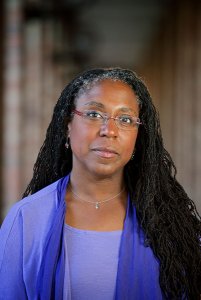Presented By: Department of Linguistics
Linguistics MLK Colloquium: Uneven success: racial bias in automatic speech recognition
Alicia Beckford Wassink, University of Washington

Dr. Wassink is Director of the Sociolinguistics Laboratory and an associate professor of Linguistics at the University of Washington. She will give a talk titled "Uneven success: racial bias in automatic speech recognition."
The event will take place on Zoom and is open to the public. A reception will follow (see separate link).
ABSTRACT
Racial bias in automatic speech recognition is an emerging area of concern in fields associated with human-computer interaction. Research to date suggests that sociolinguistic variation, namely systematic sources of sociophonetic variation, has yet to be extensively exploited in Acoustic Model architectures. This talk reports a study that evaluates the performance of one ASR system for a multi-ethnic sample of speakers from the American Pacific Northwest (including Native American, African American, European American and ChicanX speakers). Using a sociophonetic approach to characterizing vocalic and consonantal variation, I ask which dialect features appear to be most challenging for our ASR system. We also ask which error types are particular to the four ethnic dialects sampled. Recordings of both conversational and read speech were coded for a common set of 18 sociophonetic variables with distinct phonetic profiles. Automatic transcription was achieved using CLOx, a custom-built ASR system created in the University of Washington Sociolinguistics Laboratory. Normalized error frequency rates (Nf) are compared across ethnic group samples to evaluate CLOx performance. Nf error rates demonstrate clear differential performance in the ASR system, pointing to racial bias in system output. Specific predictions are made regarding approaches that might be taken to leverage sociophonetic knowledge to improve sociolect-recognition accuracy in ASR systems.
The event will take place on Zoom and is open to the public. A reception will follow (see separate link).
ABSTRACT
Racial bias in automatic speech recognition is an emerging area of concern in fields associated with human-computer interaction. Research to date suggests that sociolinguistic variation, namely systematic sources of sociophonetic variation, has yet to be extensively exploited in Acoustic Model architectures. This talk reports a study that evaluates the performance of one ASR system for a multi-ethnic sample of speakers from the American Pacific Northwest (including Native American, African American, European American and ChicanX speakers). Using a sociophonetic approach to characterizing vocalic and consonantal variation, I ask which dialect features appear to be most challenging for our ASR system. We also ask which error types are particular to the four ethnic dialects sampled. Recordings of both conversational and read speech were coded for a common set of 18 sociophonetic variables with distinct phonetic profiles. Automatic transcription was achieved using CLOx, a custom-built ASR system created in the University of Washington Sociolinguistics Laboratory. Normalized error frequency rates (Nf) are compared across ethnic group samples to evaluate CLOx performance. Nf error rates demonstrate clear differential performance in the ASR system, pointing to racial bias in system output. Specific predictions are made regarding approaches that might be taken to leverage sociophonetic knowledge to improve sociolect-recognition accuracy in ASR systems.